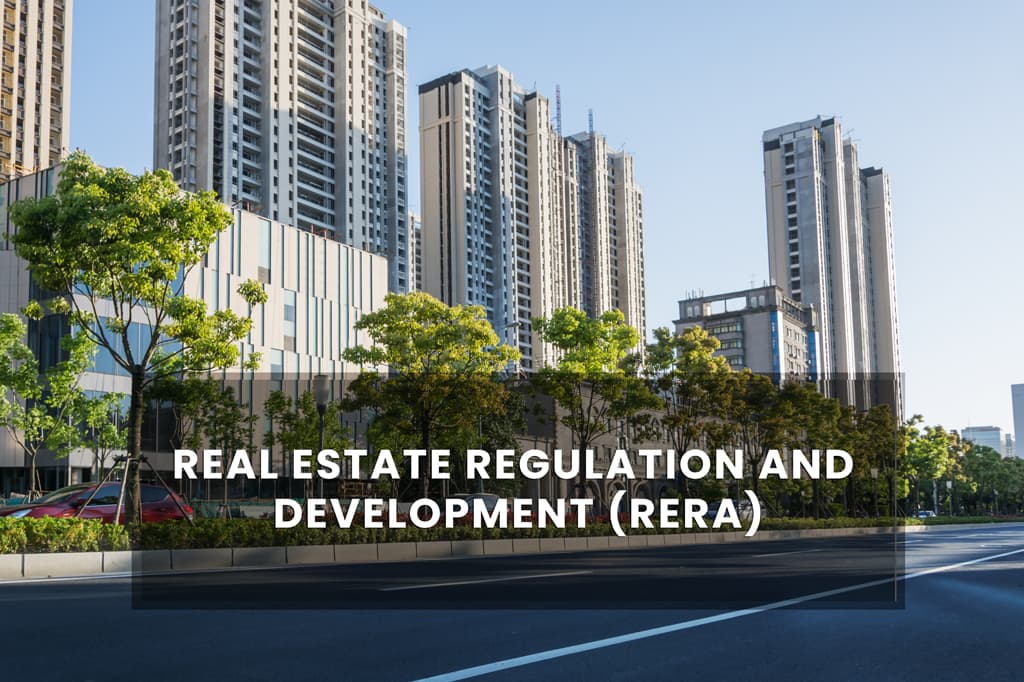INTRODUCTION
One of India’s landmark legislation is the Real Estate Regulation and Development (RERA) Act of 2016. Its goal is to promote increased accountability, transparency, and financial discipline in India’s real estate industry. This is in line with India’s vast and expanding economy as many people will invest in the real estate sector in the future.
Why this Act ?
The aim of this Act is to cut down on property fraud and project delays. It safeguards the interests of purchasers and developers. The housing and real estate industries were heavily unregulated. To overcome the lack of project transparency on the projects. To have legitimate data about the builder and to find a way around the builder’s lack of options, to safeguard consumers’ interests in the real estate industry, and to set up a system for early dispute resolution.
Highlights of the Act
Compulsory Registration: For a long time, it was felt that the real estate industry lacked a proper regulator, like the Securities Exchange Board of India for capital markets. The Demonstration lays out Land Administrative Expert in each state and association region. Stakeholder interests are protected, data is stored in a designated repository, and a robust grievance redressal system is built into its functions. The authority is required to dispose of applications within a maximum of 60 days to avoid delays and the same cannot be extended unless a reason for the delay is recorded. Additionally, appeals should be submitted to the Real Estate Appellate Tribunal(REAT).
Reserve Account: Every real estate project must be registered with the RERA of the state in which it will be built if the total area to be developed is greater than 500 square meters or if more than eight apartments are proposed to be built in any phase. The Act’s registration requirements also apply to projects that are already underway but have not received a completion certificate or occupancy certificate. Promoters are required to provide comprehensive project information when applying for registration, such as the status of the land, promoter details, approvals, completion schedule, and so on. The project cannot be advertised until registration has been completed and other construction-related approvals have been obtained.
Savings account: The fact that funds collected from one project would always be used to fund other, distinct projects was one of the primary causes of project delays. Promoters are now required to deposit 70 percent of all project receivables in a separate reserve account to prevent this kind of diversion. This account’s earnings must be certified by a professional and can only be used for land and construction costs.
Promoters’ regular disclosures: Because promoters will be required to submit periodic submissions to the regulator regarding the progress of the project, homebuyers will be able to monitor the project’s progress on the RERA website after the Act is implemented.
Title Representation: Promoters are now required to provide a positive guarantee regarding his right to title and interest in the land. This guarantee can be used against the home buyer in the event that a title defect is found. In addition, they are required to obtain title and construction insurance, the proceeds of which will be paid to the allottee when the agreement of sale is signed.
Standardization of the sale agreement: A standard model sale agreement between promoters and homebuyers is required by the Act. Punitive clauses that penalize homebuyers for any default are typically included by promoters, whereas similar defaults by the promoter typically do not carry any penalties at all. Homebuyers can anticipate more balanced agreements in the future, and penal clauses of this kind may well be the exception rather than the rule.
Penalty: Violations of the Act are subject to severe financial penalties (up to 10% of the project’s cost) and imprisonment to ensure that they are not taken lightly.
RESPONSIBILITIES OF RERA
The key responsibility of the RERA is to enforce the Act’s provisions and also it acts as the nodal organization to co-ordinate endeavors to the development of the real estate and to deliver necessary advice to the appropriate Government to ensure the development and promotion of a transparent, productive and competitive real estate sector.
Fast Track Dispute Resolution:
Fast track adjudication by the adjudicating officers (Joint Secretary to State Government) to expedite dispute resolution.
Real Estate Appellate Tribunal Creation: Real Estate Appellate Tribunal, which will hear appeals of Authority and adjudicating officer orders. One judicial and one administrative/technical member of the High Court will serve as the Appellate Tribunal’s leadership
Punitive Measures: sanctions in the event of a violation of the Act’s provisions or the orders of the Authority or the Tribunal, including the project’s de-registration and penalties
Benefits of RERA
- Informing allottees on minor addition or alteration.
- Approval of 2/3 of the beneficiaries for all other additions or changes.
- No advertisement before registration with RERA
- 2/3 consent of beneficiaries to transfer majority rights to a third party.
- Information sharing project plan, layout, government approvals, land title status, sub-contractors.
- Increased predictability for on-time project completion and delivery to consumers.
- Improved construction quality with a 5-year warranty period.
- RWAs will be formed within a specified time period or three months after the majority of units sold.
Who has to get Registered in RERA
- All commercial real estate projects with parcel sizes more than 500 square meters.
- To begin a residential real estate project, all parcels larger than eight apartments or 500 square meters must be registered with the Real Estate Regulatory Authority (RERA).
- Within three months, projects in progress that have not yet received a certificate of completion are required to apply for registration.
- The RERA requires pre-registration of real estate agents who facilitate the sale and purchase of real estate.
- Each state or federal territory grants each of these agents a unique registration number. For each sale they broker, agents are required to provide this number.
Process of Registration
- RERA requires applicants to submit an application for registration in the prescribed format, along with the required documents and fees.
- Within 30 days of the application’s date, RERA must either approve or reject registration applications. The promoter will receive a registration number, login ID, and password to enable the applicant to provide crucial information on the RERA website once registration is complete.
Registration of Projects
The promoter is in charge of obtaining the completion certificate, leasehold deed, and sale deed for the land, which must then be made available to the allottees. The promoter will specify a time frame for the real estate project’s completion or phase in the affidavit that follows the application form, after which the approved registration will be in effect.
Eligibility for Registration
RERA Registration is required of all builders and promoters who undertake a real estate project with more than 8 units or 500 square meters of development.
Registration of Agents
The Real Estate (Regulation and Development) Act of 2016 gave state governments the authority to issue RERA registration rules and regulations for real estate agent registration. Only properties with RERA registration can be sold by a real estate agent who is registered under RERA. The RERA registration is required in order to advertise, market, book, sell, offer for sale, or invite individuals to purchase a plot, apartment, or building. Dealers, brokers, and other intermediaries are all examples of real estate agents. Enlistment of specialists is legitimate for quite some time from the date of issue.
What is the RERA registration fee?
The RERA enlistment charge is different for coordinators and agents. Prices for hosts also vary by state. For instance, potential projects must pay 10 rupees per square meter for RERA registration in the residential or industrial categories. At the same time, projects with medium to low potential pay 5 rupees per square meter. The RERA registration fee for commercial projects is approximately INR 20 per square meter for projects with high potential and INR 10 per square meter for projects with medium to low potential. If the agent is an individual, the RERA registration fee for the agent is approximately Rs 25,000. Nonetheless, in the event that the specialist is certainly not an individual, the RERA enlistment charge is around INR 2,50,000.
Timeline for Registration
- For ongoing Projects – 3 months from commencement of this Act
- For new Projects – 30 days
Revocation for Registration
The registration can be revoked on complaint and can be canceled by suo moto. Where promoters make default or violates any terms or conditions of the approval of promoters involved in any kind of unfair practice.
Functions of RERA
Establishing standard fees for promoters or reagents. Ensuring compliance with regulations and other obligations imposed on Organizers and Agents. Maintaining a database on the website for public inspection of all registered developers, re-agents, and reproject details
Protection of Buyers
Unrecorded funds cannot be pumped into the industry. Today, 70% of the money must be deposited by cheque into your bank account. A significant customer benefit includes the law that manufacturers should provide cost estimates in view of covered area, not building area. The legal definition of carpet areas is clear and includes usable spaces like bathrooms and kitchens.
In conclusion, the goal of this law is to increase accountability and transparency in the land sector. In addition to safeguarding the interests of homebuyers, the presence of RERA benefits builders through increased transparency. The real estate industry has benefited from the RERA Act because it protects buyers from promoters, developers, and realtors from fraud and project delays, boosting investment and confidence in the real estate industry. Project delays and property fraud are two areas of focus for RERA. To this end, the organization has made it required for all manufacturers/engineers to finish RERA enlistment prior to beginning a venture. The law aims to increase accountability and transparency in the land sector. The idea behind RERA is sound when it is put into action this way, but some states and developers break the rules, making it very hard to use RERA for its intended purpose. It offers a variety of tools to make commercial and residential project transactions easier and more controlled, ensuring that promoters complete projects on time. However, state governments’ effective implementation makes this possible. As a result, the most crucial task is to successfully establish property management departments in all states within a year to bring about uniformity. The amendment has a lot of room for improvement despite the aforementioned flaws. The law energizes all around arranged metropolitan land improvement while safeguarding the interests of guiltless shoppers putting away their well deserved cash.
Frequently Asked Questions(FAQs)
Q1. What are the consumer obligations under the Real Estate Regulatory Authority (RERA) Act 2016?
Answer: The consumer is obliged to make timely payments to the property developer in accordance with the purchase contract. You will also have to pay registration fees, local taxes, maintenance fees, basic rent, electricity, water, and other service contributions. Under the Real Estate Regulatory Authority (RERA) Act 2016, once a property developer issues a certificate of occupancy, the consumer must obtain it within two months. If the consumer is unable to make timely payment for the purchase, the consumer is obliged to pay interest at the prescribed rate. Consumers are obliged to actively participate in the formation of clubs, cooperatives or consumer associations. The consumer participates in the entity’s escrow registration.
Q2. Can a real estate developer sell to another developer or party in mid-way to exit the project ?
Answer: The developer may sell the project to another investor, but only with the written consent of two-thirds of the project’s consumers and prior approval from the Real Estate Regulatory Authority (RERA). can. Again, if a consumer or her family members, or otherwise holds multiple entities in the project, that consumer is considered her one consumer. In addition, the Real Estate Regulatory Authority (RERA) must be notified of any such sale, and the purchasing developer assumes all rights and obligations of the previous promoter (including project delivery dates and other matters).
Q3. Does the Real Estate Regulatory Authority (RERA) Act of 2016 apply to Gram Panchayat?
Answer: In connection with the active implementation of this law, existing local building management agencies, such as city planning departments, development agencies, Gram and Zillah Panchayats, or block development officers, will be encouraged to take action on projects underway in the area. I might make a list.
Q4. What is the validity of registration under the Real Estate Regulatory Authority ?
Answer: Registrations are valid for the period required to complete the project or phase specified by the builder/developer.
Q5. What happens if the developer or builder doesn’t deliver during the validity period?
Answer: Registration validity is based on the builder’s own estimates. Therefore, they are responsible for meeting deadlines. Otherwise, you risk suffering a loss or having to pay a fine.
Q6. Is it safe to buy land, apartments or vacation homes approved by the Real Estate Regulatory Authority (RERA) Act 2016?
Answer: If a consumer wants to buy a piece of land, an apartment, or a vacation home today, they are encouraged to purchase a project approved by the Real Estate Regulatory Authority (RERA) Act 2016. If a consumer purchases land, apartments or villas from the RERA from an unregistered developer, the bank may refuse to make installments of the loan amount if the project is not registered with her RERA agency in the respective state.
Q7.How can I check my RERA registration number?
Answer: Buyers can find the RERA registration number on each state portal. Each web portal contains a list of registered projects as well as RERA registration numbers, permits and other documents.
Q8.How do I lodge a complaint with RERA?
Answer: Complaints under RERA must be made in the form prescribed by each state’s regulations. Complaints may be filed in relation to projects registered with RERA within the prescribed period for violations or violations of the provisions of laws or rules or regulations established under RERA.
Q9:How long is the certificate valid for?
Answer: The issued RERA approval certificate is valid for 5 years
Q10. What happens if RERA is denied?
Answer: If the RERA registration is refused or cancelled, the purchaser must request a full refund of all charges, including damages and compensation.





